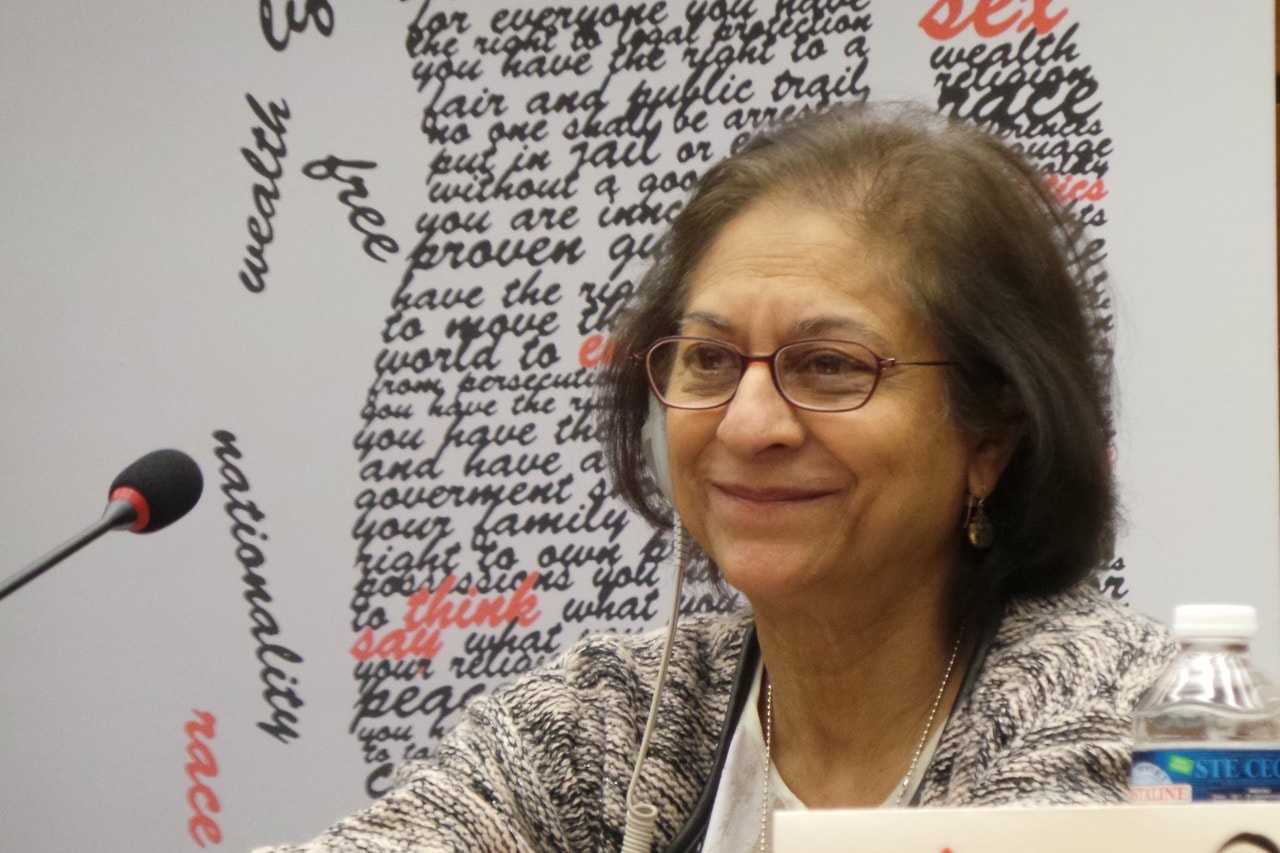ARTICLE 19 calls on States at the UN Human Rights Council (HRC) to stand with Iranians and civil society in calling for immediate reforms to protect freedom of expression and information in the country.
This statement was originally published on article19.org on 27 February 2018.
As we mourn the passing of Asma Jahangir, the UN Special Rapporteur on the human rights situation in Iran, ARTICLE 19 calls on States at the UN Human Rights Council (HRC) to stand as she did with Iranians and civil society in calling for immediate reforms to protect freedom of expression and information in the country.
On 28 December 2017, widespread protests broke out across Iran on an unprecedented scale, making it the country’s biggest anti-government demonstration since the post-election protests in 2009. The crackdown in response to the protests has been heavy handed and repressive. Internet shutdowns during the protests highlight the extent to which the government exercises an iron grip over the free flow of information in Iran.
These recent developments only add to continuing concerns ARTICLE 19 has regarding violations of the right to freedom of expression in Iran. Notwithstanding some improvements in diplomatic relations between Iran and other countries in recent years, and the welcome launch of the Citizen Charter by President Rouhani in February 2017, the rights to freedom of expression, association, peaceful assembly, and privacy, continue to be violated, online and offline. Activists, journalists, trade unionists, lawyers, artists, academics, women and ethnic and religious minorities are increasingly being harassed and intimidated, detained and subjected to torture, inhuman and degrading treatment.
Notwithstanding these challenges, Asma Jahangir had made significant progress as Special Rapporteur in engaging the Iranian government in dialogue regarding the human rights situation; her death came days before she was scheduled to meet with Iran’s Ministry of Foreign Affairs. This demonstrates that international and objective scrutiny by the HRC has positive impact; anything less than increased support for the renewal of the Special Rapporteur mandate at this point in time would send precisely the wrong message, at precisely the wrong time.
At the 37th Session of the UN Human Rights Council, ARTICLE 19 calls on States to raise the following freedom of expression concerns at every available opportunity, and increase their support for the renewal of the Special Rapporteur mandate.
Killings and arrests of protesters
In late December 2017, the government heavily cracked down when thousands took part in protests that spread across the country in response to widespread discontent around socio-economic concerns. The use of force against protesters included the use of tear gas, water canons, and physical attacks from authorities using batons, and other assaults.
21 individuals were killed during the protests, predominately by security forces, and there has been no independent investigation either into their deaths, or into the authorities’ use of lethal force during the protests. While the majority of those detained have been released, of the more than 4,970 people arrested following the protests, many remain in custody without charge.
Three of the protesters arrested, Sina Ghanbari, Vahid Heidari and Saro Ghahremani, subsequently died in custody. Instead of independently investigating the deaths in custody, officials have alleged that Ghanbari and Heidari died by suicide, also alleging Heidari was in possession of drugs. A video of a seemingly coerced statement from the father of Saro Ghahremani, stating that Ghahremani died in a violent clash with the police at the protest, was aired on the government-owned national television. In each case, there are reports of signs of torture on the bodies returned to families.
States at the HRC must call for a full investigation into the use of force, in particular the use of lethal weapons, during the December 2017 protests, as well as the deaths in custody of protesters, and immediately charge or release other protesters who remain in detention. The government must respect, protect and fulfil the right to protest of all in Iran.
Internet shutdowns and blocking during protests
There have been intensive efforts from various branches of the Iranian government to restrict freedom of expression online, and undermine users’ right to privacy. This is a very concerning regression, given previous seemingly positive attitudes of the Iranian government during the Presidential elections in May 2017, when the Internet remained relatively open.
During protests in December 2017 and January 2018, Internet users reported intermittent periods of disconnection on their mobile phones to websites and applications hosted outside of Iran. This included reports of the blocking of apps Telegram and Instagram, as well as other periods of blocking access to websites hosted on foreign servers. Circumvention tools such as “Lantern” were also targeted by blocking access to cloud host services such as Digital Ocean, despite the fact that many local businesses use this same website for many other purposes. Following the removal of the block on Telegram, both the company and users confirmed the government was throttling Telegram traffic in Iran.
Internet shutdowns of this nature clearly violate international human rights law. HRC resolution 33/13, adopted by consensus in June 2016, “condemns unequivocally measures to intentionally prevent or disrupt information online in violation of international human rights law” and called on States to desist from such practices. However, reports from the Minister for ICTs confirmed that the National Security Council ordered the Internet Exchange Point to disrupt internet traffic, indicating that even national legal procedures were not followed. According to the national legal framework, filtering should follow a decision of the multi-agency body of the Committee Charged with Determining Offensive Content, which is situated within the judicial rather than security branch.



